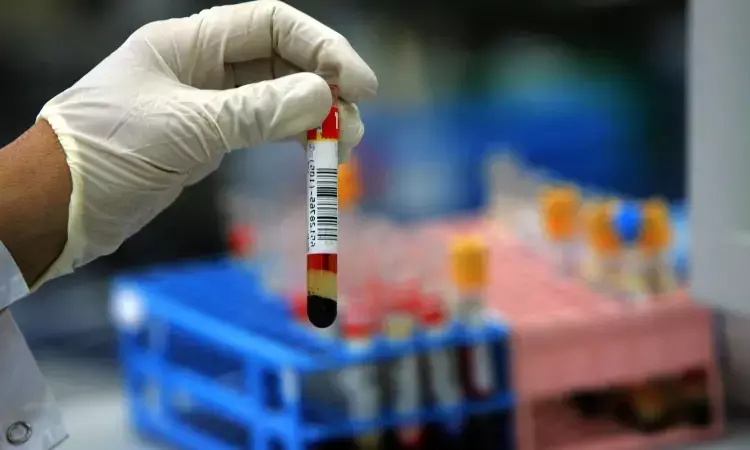- Home
- Medical news & Guidelines
- Anesthesiology
- Cardiology and CTVS
- Critical Care
- Dentistry
- Dermatology
- Diabetes and Endocrinology
- ENT
- Gastroenterology
- Medicine
- Nephrology
- Neurology
- Obstretics-Gynaecology
- Oncology
- Ophthalmology
- Orthopaedics
- Pediatrics-Neonatology
- Psychiatry
- Pulmonology
- Radiology
- Surgery
- Urology
- Laboratory Medicine
- Diet
- Nursing
- Paramedical
- Physiotherapy
- Health news
- Fact Check
- Bone Health Fact Check
- Brain Health Fact Check
- Cancer Related Fact Check
- Child Care Fact Check
- Dental and oral health fact check
- Diabetes and metabolic health fact check
- Diet and Nutrition Fact Check
- Eye and ENT Care Fact Check
- Fitness fact check
- Gut health fact check
- Heart health fact check
- Kidney health fact check
- Medical education fact check
- Men's health fact check
- Respiratory fact check
- Skin and hair care fact check
- Vaccine and Immunization fact check
- Women's health fact check
- AYUSH
- State News
- Andaman and Nicobar Islands
- Andhra Pradesh
- Arunachal Pradesh
- Assam
- Bihar
- Chandigarh
- Chattisgarh
- Dadra and Nagar Haveli
- Daman and Diu
- Delhi
- Goa
- Gujarat
- Haryana
- Himachal Pradesh
- Jammu & Kashmir
- Jharkhand
- Karnataka
- Kerala
- Ladakh
- Lakshadweep
- Madhya Pradesh
- Maharashtra
- Manipur
- Meghalaya
- Mizoram
- Nagaland
- Odisha
- Puducherry
- Punjab
- Rajasthan
- Sikkim
- Tamil Nadu
- Telangana
- Tripura
- Uttar Pradesh
- Uttrakhand
- West Bengal
- Medical Education
- Industry
Simple Blood Test Marker May Predict GI Cancer Risk:Study

A recent study involving 19,388 participants identified the platelet-to-high-density lipoprotein ratio (PHR) as a promising biomarker for gastrointestinal (GI) cancer risk. Individuals in the highest PHR quartile faced a 3.09-fold increased risk of GI cancers, with stronger associations seen in older adults, males, and obese individuals. A dose-response relationship was observed at PHR values of 3.2 and 4.5.
Gastrointestinal (GI) cancers, including gastric, colorectal, and esophageal cancers, pose a significant global health burden. Despite advancements in diagnostic tools, early detection remains challenging, particularly in low-resource settings. Emerging evidence highlights the platelet-to-high-density lipoprotein ratio (PHR) as a novel biomarker integrating systemic inflammation and lipid metabolism. However, its association with GI cancer risk remains underexplored.
This study utilized data from the National Health and Nutrition Examination Survey (NHANES) from 2010 to 2018, comprising 19,388 participants, including 230 with GI cancers. PHR was calculated as the ratio of platelet count to high-density lipoprotein cholesterol levels and categorized into quartiles. Weighted logistic regression models, restricted cubic spline analysis, and subgroup analyses were employed to evaluate the association between PHR and GI cancer risk, adjusting for demographic, socioeconomic, lifestyle, and clinical factors.
Results: Elevated PHR was independently associated with an increased risk of GI cancers. Participants in the highest PHR quartile exhibited a significantly higher risk (adjusted OR = 3.09; 95% CI: 2.16-4.43) compared to the lowest quartile. A dose-response relationship was observed, with two critical inflection points at PHR values of 3.2 and 4.5. Subgroup analyses revealed stronger associations among older adults, males, and obese individuals. The findings suggest that PHR may reflect the dynamic balance of systemic inflammation and lipid metabolism, contributing to tumorigenesis.
This study identifies PHR as a promising, cost-effective biomarker for early detection and risk stratification of GI cancers. Its integration into screening programs could improve precision medicine strategies by identifying high-risk individuals for early intervention. Further longitudinal and mechanistic studies are warranted to confirm these findings and explore the underlying biological mechanisms.
Reference:
Tong Y, Lou X. Platelet-to-high-density lipoprotein ratio (PHR) as a predictive biomarker for gastrointestinal cancers: evidence from NHANES. BMC Gastroenterol. 2025 Apr 27;25(1):302. doi: 10.1186/s12876-025-03860-9. PMID: 40289098; PMCID: PMC12036308.
Dr. Shravani Dali has completed her BDS from Pravara institute of medical sciences, loni. Following which she extensively worked in the healthcare sector for 2+ years. She has been actively involved in writing blogs in field of health and wellness. Currently she is pursuing her Masters of public health-health administration from Tata institute of social sciences. She can be contacted at editorial@medicaldialogues.in.
Dr Kamal Kant Kohli-MBBS, DTCD- a chest specialist with more than 30 years of practice and a flair for writing clinical articles, Dr Kamal Kant Kohli joined Medical Dialogues as a Chief Editor of Medical News. Besides writing articles, as an editor, he proofreads and verifies all the medical content published on Medical Dialogues including those coming from journals, studies,medical conferences,guidelines etc. Email: drkohli@medicaldialogues.in. Contact no. 011-43720751


